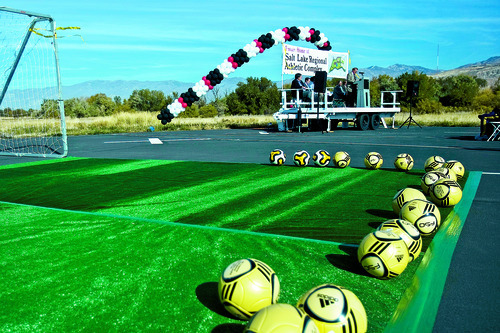This is an archived article that was published on sltrib.com in 2011, and information in the article may be outdated. It is provided only for personal research purposes and may not be reprinted.
Turns out, suing all your residents works.
Salt Lake City this week scratched its seven-year itch to begin building a 16-field sports complex near the Jordan River after a judge ruled the city's $15.3 million bond — approved by voters in November 2003 — is valid.
Now, instead of just minor excavation near 1900 West and 2200 North, the city's construction of the 160-acre complex — pending a possible appeal — can begin in earnest.
Third District Judge Robert Hilder's ruling comes a month after an unconventional court hearing in which the city technically sued its residents under the rarely used Bond Validation Act. The procedural tool was necessary, according to City Attorney Ed Rutan, to get an expedited ruling on a bond held hostage by legal challenges from the Jordan River Restoration Network.
In his 22-page ruling, Hilder deems the bond validation "not even a close case."
"The court finds that there is neither mystery nor deceit in the fact that the site and the specifics of the facility are not precisely as originally discussed," Hilder wrote, adding that changes in the design and a higher overall price don't invalidate the bond.
"The period for contesting the validity of the bond election expired on Dec. 23, 2003," he wrote. "No party contested the election."
Hilder also said environmental concerns "may yet find an effective voice in another forum," but he noted his court was compelled by statute to narrow the scope of the proceedings to the legality of the bond.
"We're disappointed," said Jeff Salt, head of the river network, which has five additional legal challenges that have slowed construction on the project. Salt says his group also plans to appeal Hilder's ruling.
Salt maintains that statements by Mayor Ralph Becker and his department head — who testified last month — were inconsistent and contradictory. And he says the unusual hearing itself violated due process.
The city hopes to complete its complex of 15 soccer fields and one championship field — with stadium seating and lighting — next year. The fields, which could also be used for lacrosse, rugby and football, sit in a flood plain, which is risky and irresponsible, the river network argues.
The plan calls for a Jordan River buffer, which will be funded, in part, by the bond.
"This is clearly a positive development for the city," said Rutan, calling the decision carefully considered and well-reasoned. "We thought we put on a very good case."
It is unclear how an appeal could impact the construction schedule or completion date. Rutan notes that state law encourages expedited action by the Utah Supreme Court.



